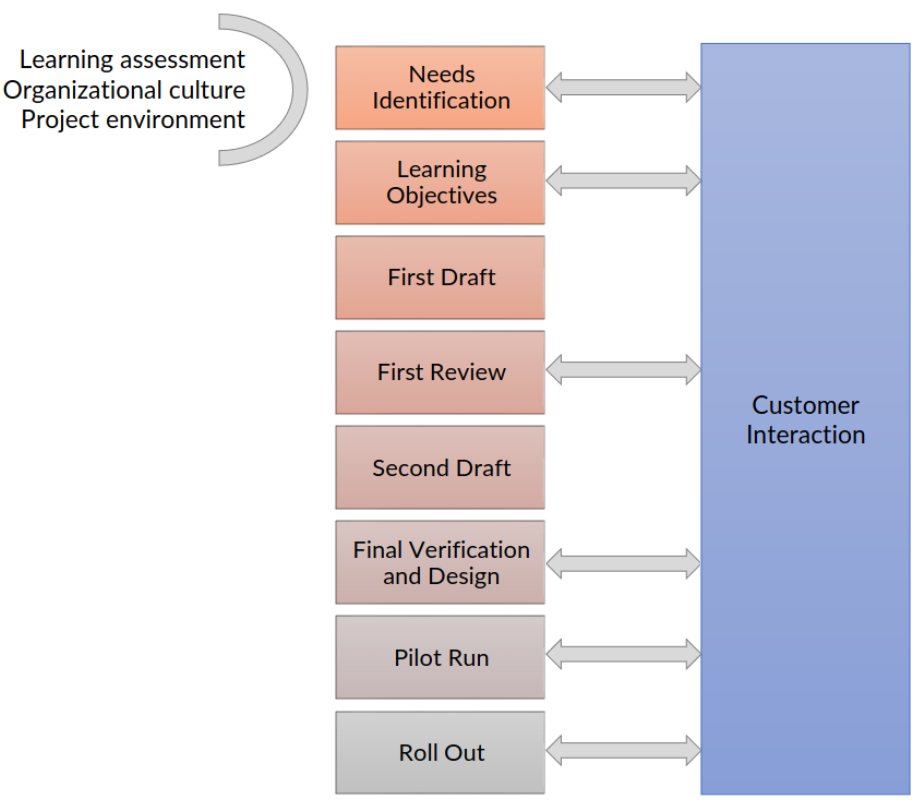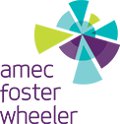

Consulting > Learning & Development Consulting > Custom Course Development
For organizations that seek competitive advantage through investment in human resources, Procept’s in-house and customized training programs can be the solution. Our off-the-shelf programs can be customized to reflect your specific learning requirements, business processes, culture or industry. Alternatively, we can custom design a program specifically for your organization in consultation with one of our subject matter experts. Create your own program length, course content and instructional schedule. Mix and match from different disciplines to create the right fit for your organization!
In our course design, development, and delivery, we follow a structured approach to training using established adult education principles. We use our Custom Course Design Profile tool to identify specific organizational performance objectives in terms of knowledge, skills, and attitude while designing custom assessments to measure training program effectiveness.
Click on the tabs below to find out more about our custom course design and development services.
Procept’s course design philosophy is based on adult education principles; specifically in all course design, development, and delivery, Procept follows a structured approach to training using practices based upon adult learning theory including Bloom’s taxonomy, Fleming’s four learning modalities (visual, auditory, read/write, and kinesthetic), and Knowles’ theories of andragogy.
In fact, Practical Management Instruction (PMI), an operating division of Procept USA LLC, a wholly-owned subsidiary of Procept Associates Ltd., has been teaching instructional design, effective classroom instruction techniques, and andragogical principles since its founding in 1963. Four of the past five presidents of PMI have PhD’s in adult learning, giving evidence to the company’s focus on helping adults improve their knowledge and skills in the most effective ways.
Most of Procept’s courses are instructor-led with a combination of lectures, group activities, question and answer sessions, videos and discussions regarding how these tools can be applied, and individual assignments. During the course delivery cycle, instructors will encourage a high level of participation, sharing and interaction amongst the class to draw out examples specific to each client. Instructors ask leading questions at the start of each course to identify those with stronger versus weaker knowledge or skills and often perform an informal needs analysis to understand why students have come to the course and to determine what types of examples/stories to use to illustrate concepts that may resonate better with the students and what topics may need further in-depth coverage to address student needs.
To ensure that each participant has an understanding of key concepts, and to ensure that the course objectives have been met, Procept includes:
All of Procept’s instructors are not only experts in their fields but also have received intensive training in the design and delivery of instructional materials and programs for adult learners. Care is taken to incorporate the following adult learning principles and techniques to accelerate learning:
One of Procept’s strengths has been its ability to develop and deliver highly-customized courses for clients that address their unique situations. We do not believe that "one size fits all."
Procept uses Bloom’s taxonomy and adult learning theory using a process shown in the diagram below during our course development activities

Learning Objectives: Procept will identify learning objectives and learning outcomes using its custom course design profile. This is usually based on a learning needs assessment that can include data captured from surveys, knowledge-based exams, or observations of real or simulated activities.
First Draft: Developed based on the learning objectives, using client materials (where applicable) and materials from Procept’s own course library. The first draft of instructional materials in PowerPoint is created, which usually does not include workshop or exercise details but does include a lesson plan and placeholders.
First Review and Second Draft: After the client’s feedback and review, Procept produces a complete second draft of instructional materials in PowerPoint and supporting files for workshops and exercises, which is polished and finalized by Procept’s graphic designer. The second draft can be delivered as a pilot or reviewed a second time by the client.
Second Review and Final Draft: After the second round of feedback and review from the client, Procept produces a final draft of instructional materials, which is finalized by its graphic designer. The participant guide is assembled in electronic format and prepared for delivery. The instructor guide is also prepared consisting of: Finalized syllabus, Lesson guides for each slide and handout, Master copies of handouts and Master copies of the Presentation Deck.
Roll-out: Post-delivery, Procept will update the Presentation Deck, Student Guide and Instructor Guide.
Procept is fully able to meet AODA, ADA and other legal accessibility requirements in the delivery of our course materials and in other classroom accommodations for participants with various disabilities. In past, we have delivered course materials in large print format, modified materials to better accommodate screen readers, had simultaneous sign-language translators, and have modified classroom activities to allow those with physical disabilities to participate. With student permission, we have also rearranged classroom seating to better position those with vision or hearing challenges. We also have the capability to print student workbooks and handouts in braille.
Procept is ready, willing, and able to work with you to accommodate those with special needs due to physical, mental, or emotional challenges.
Procept has been preparing and delivering customized training solutions to clients since the 1980s. Several client references are shown below:
| AMEC FOSTER WHEELER — For this global engineering firm, Procept developed a 5-day course which combines experiential project management learning with preparation for the PMP examination. With our partner in the UK, we designed a new 4-day AMEC Project Controls Professional course aligned with cost engineering best practices. We present these courses at AMEC locations in North and South America. |  |
| ATI TECHNOLOGIES INC. — When ATI Technologies developed a new project analysis and delivery methodology, they chose Procept to develop and deliver customized training. We worked closely with ATI to adapt existing material and integrate ATI templates into a program of four customized courses to roll out the ATI methodology to their staff and show how it fits in with cross-industry best practices. |  |
| CITY OF TORONTO — Procept was hired to review and revise the City’s existing project management courses to improve them and bring up to date with the current edition of PMI’s Guide to the Project Management Body of Knowledge–course outlines, descriptions, PowerPoint slide decks, participant workbooks, instructor guides, pre- and post-assessments, and job aids. We also designed a new introductory project management course with accompanying course materials. |  |
| GENERAL DYNAMICS LAND SYSTEMS — Procept was hired to provide GDLS employees with the fundamental knowledge and skills manage projects. We regularly present 2-day and 3-day Project Management Essentials courses. We designed and delivered a series of ½ day Earned Value Management courses to a total of 140 staff. |  |
| MECHANICAL CONTRACTORS ASSOCIATION OF ONTARIO — Procept designed and currently presents a 10-day multiple-speaker Mechanical Contracting Project Management course, in partnership with the University of Waterloo. Started in 1999, it is run in different Canadian cities, and is almost always sold out. |  |
| NATIONAL ENERGY BOARD — By competitive proposal, Procept was awarded a contract by Canada’s NEB to provide staff with a common understanding of good project management practices and an alignment with PMI terminology. Starting with our proprietary “Project Management Assessment Survey”, we custom-designed three project management seminars for NEB at different levels: half-day Team Leader, 2-day Level 1 PM, and 2-day Level 2 PM. |  |
| ONTARIO POWER GENERATION — Procept has been custom-designing and delivering project management consulting and training to Ontario Hydro and its successor OPG since 1994. Our most recent assignment was to design and present a 2-day course on Contract Monitoring, to train field staff in the monitoring of construction contractors. Those staff had been supervisors of direct-hire construction tradesmen prior to a change of construction strategy by OPG. |  |
| PROFESSIONAL SURVEYORS OF CANADA — Commissioned by the Association of Ontario Land Surveyors, Procept developed a one-day course on project management for land surveyors, utilizing scenarios appropriate for PSC members across Canada. |  |
| UNIVERSITY OF TORONTO — Procept designed and Procept has been preparing and delivering customized training solutions to clients since the 1980s. Several client references are shown below:esented introductory, intermediate and advanced project management courses, business analysis courses, and ITIL IT service management courses for 15 years, through the University of Toronto Faculty of Engineering Professional Development Centre (no longer in existence). Procept founder and President at the time, Keith Farndale, was the Project Management Program Director for the Project Management Initiative there. All courses were aligned with professional bodies of knowledge and were designed for an audience with diverse experience. |  |
| UNIVERSITY OF WISCONSIN, SCHOOL OF BUSINESS — For a UW Executive Education Masters Certificate, we combined and adapted our existing business analysis instructional material to create a new 3-day course Defining and Managing Business Requirements. |  |
| VALE — Vale is the second largest mining company in the world. In their Canadian operations (formerly Inco), Procept has been providing project management training since 1998. For our Comprehensive Project Management Seminar, we added a customized case study to reflect their own engineering / construction projects. We have also frequently delivered our 3-day Project Management Essentials and PM Essentials for Construction courses. |  |